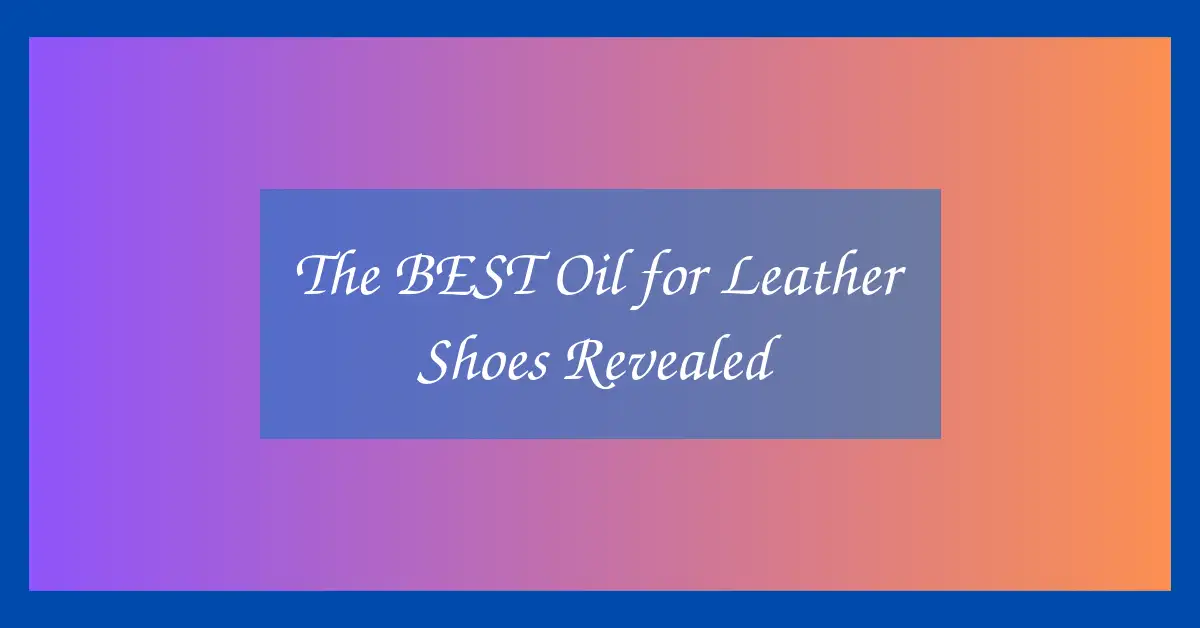The BEST Oil for Leather Shoes Revealed
Leather shoes are a timeless investment, known for their durability, style, and comfort. However, without proper care, even the finest leather can dry out, crack, and lose its natural luster. This is where choosing the best oil for leather shoes becomes essential. Leather is essentially animal hide, and just like skin, it needs nourishment and moisture to remain flexible and strong. Using the right oil not only protects the shoes from water and scuff damage but also helps maintain their shine and extend their lifespan. With so many options available from natural oils like mink and neatsfoot to modern blends, it’s important to know which type suits your footwear. The right choice will keep your shoes supple, attractive, and long-lasting, while the wrong one could stain or weaken the leather over time.
Top 10 Oils for Leather Shoes
Table of Contents
Toggle1. Red Wing Heritage All Natural Boot Oil
Red Wing’s All Natural Boot Oil is a trusted choice for conditioning premium leather shoes. Made with a blend of pine pitch and mink oil, it penetrates deep into the leather, restoring flexibility and enhancing durability. The natural ingredients help replenish essential oils lost over time, making it an eco-friendly yet powerful solution. Unlike synthetic alternatives, this oil conditions without leaving sticky residue.
One of the standout features of this oil is its ability to provide excellent weather resistance. For shoes that encounter rain, mud, or snow, Red Wing Boot Oil creates a subtle barrier against moisture. It also restores the original richness of dark leather, giving shoes a polished and elegant look. This makes it a great option for boots, dress shoes, or any high-quality leather footwear.
Application is simple and smooth. With a soft cloth, the oil spreads evenly and absorbs quickly, ensuring minimal downtime before the shoes can be worn again. Unlike heavier oils, it doesn’t oversaturate the leather or compromise breathability.
However, one important consideration is that this oil tends to darken lighter-colored leathers. If you want to maintain the original shade of tan or beige shoes, it may not be the best choice. Testing on a hidden section before full application is recommended.
Overall, Red Wing Heritage Boot Oil remains a premium product that nourishes leather shoes effectively. It’s especially suitable for darker leathers and outdoor shoes that demand extra protection. For long-term care, this oil delivers exceptional conditioning with natural ingredients.
Pros:
-
Made with natural pine pitch and mink oil
-
Excellent for restoring dark leather
-
Provides solid weather resistance
-
Absorbs quickly without residue
Cons:
-
Darkens light-colored leather
-
Slightly more expensive than generic oils
2. Bickmore 100% Pure Neatsfoot Oil
Bickmore’s Pure Neatsfoot Oil is a traditional favorite for leather shoe care. Derived from cattle bones, it has long been used to preserve, soften, and condition leather. Its deep-penetrating formula rejuvenates dry, cracked leather, restoring flexibility and comfort. The oil’s time-tested effectiveness makes it popular among shoe owners and leather craftsmen alike.
This product excels at reviving older shoes. If your footwear has stiffened over years of wear, Neatsfoot Oil restores pliability and helps prevent further cracking. It also provides mild water resistance, shielding shoes against everyday spills and moisture. For heavily used work boots or classic leather shoes, it’s a practical choice.
The application process is straightforward. A small amount rubbed into the leather with a cloth quickly absorbs, leaving shoes softer and more comfortable. It doesn’t take much oil to make a significant difference, so one bottle lasts a long time.
On the downside, Neatsfoot Oil has some limitations. Over-application can oxidize leather, causing it to stiffen over time. Additionally, it tends to darken lighter shoes, which might be undesirable for certain styles. Using it sparingly and only when necessary is the key to maintaining results.
Overall, Bickmore Neatsfoot Oil is a classic and reliable product. It’s ideal for work boots, outdoor shoes, and older leather footwear that needs deep restoration. For those who appreciate traditional leather care methods, this oil is a solid investment.
Pros:
-
Deeply restores dry, stiff leather
-
Long-lasting formula, small amounts needed
-
Affordable and widely available
-
Revives older shoes effectively
Cons:
-
Can darken light leather significantly
-
Overuse may cause oxidation issues
3. Obenauf’s Leather Oil
Obenauf’s Leather Oil is a highly respected conditioner known for its protective qualities. Originally developed for wildland firefighters, it’s designed to withstand extreme conditions. The formula includes natural oils and beeswax, which combine to both nourish and protect leather. It’s especially beneficial for outdoor shoes that face harsh weather or rugged terrain.
One of Obenauf’s strengths is its ability to resist water and repel dirt. The beeswax component creates a breathable layer that shields shoes without clogging pores. For those who wear leather shoes in wet environments, this oil helps prevent damage from prolonged moisture exposure.
Application is user-friendly. The oil comes with a built-in applicator cap, making it easy to apply evenly. It penetrates quickly, rejuvenating leather fibers and restoring flexibility. Shoes treated with Obenauf’s feel supple yet firm, offering comfort and resilience.
While it excels in durability, Obenauf’s can darken lighter shoes more than other oils. It’s best suited for darker tones where deepening the leather’s color is desirable. Additionally, because of the beeswax blend, it may feel slightly heavier than pure oils.
In conclusion, Obenauf’s Leather Oil is perfect for those seeking protection and longevity. It’s especially valuable for work boots, hiking shoes, and everyday footwear exposed to outdoor elements. For performance and protection, this oil stands out as a professional-grade product.
Pros:
-
Developed for extreme conditions
-
Contains natural oils and beeswax
-
Provides excellent water resistance
-
Built-in applicator cap for easy use
Cons:
-
Darkens leather noticeably
-
Heavier consistency than pure oils
4. Fiebing’s Golden Mink Oil
Fiebing’s Golden Mink Oil is a popular option for softening and conditioning leather shoes. It offers a blend of mink oil, silicone, and lanolin, making it highly effective for waterproofing and preserving leather. This oil is widely used by both casual shoe owners and professionals who need reliable results.
One of its key benefits is waterproofing. The silicone content repels water while the mink oil nourishes the leather, preventing cracks and dryness. This dual action makes it particularly suitable for shoes frequently exposed to rain or damp environments. It also enhances the color of leather, giving shoes a richer, well-maintained appearance.
Fiebing’s Golden Mink Oil applies smoothly. It spreads evenly and absorbs well, without leaving excessive residue. Shoes feel more comfortable and flexible after just one application. It’s also budget-friendly, making it a practical choice for regular use.
On the downside, this oil can significantly darken light-colored shoes. The silicone component, while great for waterproofing, may slightly alter the texture of certain delicate leathers. Testing on a small area first is always recommended.
Overall, Fiebing’s Golden Mink Oil balances conditioning with waterproofing. It’s especially useful for casual leather shoes and boots that see frequent outdoor wear. For affordability and effectiveness, it’s a strong contender.
Pros:
-
Excellent waterproofing properties
-
Affordable and widely available
-
Softens and conditions effectively
-
Enhances color richness
Cons:
-
Darkens leather considerably
-
Not ideal for delicate finishes
5. Lexol Leather Conditioner Oil
Lexol Leather Conditioner Oil is a well-known and widely trusted option for leather shoe care. Its formula is pH-balanced and designed to condition without leaving a greasy feel. Unlike heavy oils, Lexol penetrates gently, making it suitable for regular use on fine leather shoes.
One of Lexol’s strengths is its versatility. It works well on smooth leathers, including dress shoes, casual shoes, and boots. The conditioner restores flexibility, preventing cracking and dryness without overly darkening the material. This makes it a great choice for maintaining lighter-colored footwear.
Application is simple, with a clean cloth or sponge. The oil absorbs quickly, leaving a soft finish. It doesn’t attract dust or dirt, ensuring shoes look polished after treatment. Its neutral formula makes it safer for delicate leathers compared to traditional oils.
While Lexol offers reliable care, it does not provide strong waterproofing. For shoes that face heavy rain or snow, pairing it with a waterproof spray may be necessary. It also may require more frequent applications compared to thicker oils like mink or neatsfoot.
In conclusion, Lexol Leather Conditioner Oil is ideal for those who want a safe, balanced option. It’s especially suitable for dress shoes and light leathers that need regular conditioning without darkening. For everyday shoe maintenance, it’s a dependable product.
Pros:
-
pH-balanced and safe for delicate leathers
-
Doesn’t darken shoes significantly
-
Absorbs quickly with no greasy residue
-
Versatile for many shoe types
Cons:
-
Limited waterproofing ability
-
Requires more frequent applications
6. Huberd’s Shoe Oil
Huberd’s Shoe Oil is a traditional formula that has been trusted by outdoorsmen and workers for decades. Made with natural oils and beeswax, it’s designed to soften leather while providing strong weather resistance. This makes it especially valuable for heavy-duty leather shoes and boots exposed to demanding conditions.
The oil penetrates deeply into the leather, restoring essential moisture and keeping shoes flexible. The beeswax creates a protective layer that repels water, dirt, and salt, which is ideal for outdoor use. This makes Huberd’s a practical choice for hiking boots, work boots, and rugged casual shoes.
Application is simple, though the oil has a slightly thicker consistency compared to lighter blends. It spreads evenly with a cloth or brush, and while it takes a bit longer to absorb, the payoff is lasting protection.
A key consideration is that Huberd’s tends to darken leather significantly, especially lighter colors. It may also alter the texture slightly, giving shoes a more matte finish. For users who prioritize appearance over durability, this may be a drawback.
Overall, Huberd’s Shoe Oil is best for those who need durability above all else. It excels in conditioning and protection, making it a reliable option for shoes that endure daily wear in harsh environments.
Pros:
-
Long-lasting protection
-
Contains natural oils and beeswax
-
Excellent for outdoor and work shoes
-
Deeply nourishes leather
Cons:
-
Darkens light-colored leather significantly
-
Takes longer to absorb
7. Saphir Medaille d’Or Renovateur Oil
Saphir Medaille d’Or Renovateur is widely regarded as one of the best high-end leather care products available. Known as “liquid gold” among shoe enthusiasts, it offers luxury conditioning with natural ingredients like mink oil, lanolin, and beeswax. It’s crafted in France and is particularly suited for premium dress shoes.
This oil nourishes leather deeply, restoring softness and suppleness without oversaturating. Unlike some heavy oils, it enhances the natural shine of leather rather than dulling it. For fine calfskin or high-quality leather shoes, this product helps preserve their original elegance.
The application process is smooth and easy. Renovateur spreads evenly, absorbs well, and leaves a polished finish. Many users find that shoes treated with this oil look showroom-ready after just one use.
While it’s an exceptional product, the cost is higher than most oils on the market. It’s best reserved for luxury shoes where appearance and longevity are paramount. Additionally, because of its conditioning power, it should be used sparingly to avoid oversaturation.
In conclusion, Saphir Renovateur Oil is perfect for owners of premium leather shoes. It balances nourishment, shine, and protection, making it a top-tier option for maintaining elegant footwear.
Pros:
-
Luxury leather care formula
-
Contains natural mink oil, lanolin, and beeswax
-
Enhances shine and suppleness
-
Ideal for fine dress shoes
Cons:
-
Expensive compared to standard oils
-
Best used sparingly to avoid buildup
8. Griffin All-Weather Leather Oil
Griffin All-Weather Leather Oil is a practical and budget-friendly solution for maintaining everyday leather shoes. It’s formulated to condition and protect against common elements like rain, dirt, and salt. This makes it a versatile option for casual and work footwear.
The oil penetrates leather fibers, softening and restoring flexibility. It also provides a degree of waterproofing, keeping shoes more resilient during wet conditions. While not as heavy-duty as some premium options, it offers reliable results for routine care.
Application is straightforward, and the oil spreads easily with a cloth or applicator. It absorbs quickly, leaving shoes supple without feeling greasy. Its balanced formula makes it safe for various types of smooth leather.
On the downside, Griffin’s Leather Oil does not offer the same longevity as higher-end alternatives. Reapplication is needed more frequently to maintain results. It also has a tendency to darken leather slightly, especially lighter tones.
Overall, Griffin All-Weather Leather Oil is ideal for shoe owners seeking affordability and convenience. It delivers consistent conditioning and protection, making it a good choice for everyday shoes.
Pros:
-
Affordable and widely available
-
Easy to apply and quick absorbing
-
Provides mild waterproofing
-
Suitable for casual shoes and boots
Cons:
-
Requires frequent reapplication
-
Can darken lighter leather
9. Kiwi Conditioning Oil
Kiwi is one of the most recognizable names in shoe care, and its Conditioning Oil lives up to the brand’s reputation. This product combines mink oil, silicone, and conditioning agents to provide both nourishment and weather protection. It’s suitable for a wide range of leather shoes, from casual wear to rugged boots.
One of Kiwi’s key advantages is accessibility. It’s widely available in most markets and offers consistent results at a budget-friendly price. The formula softens leather, restores lost oils, and adds flexibility, making shoes more comfortable to wear.
The oil is easy to apply and penetrates quickly, leaving a natural finish. It also enhances water resistance, making it a practical choice for shoes exposed to everyday weather. Users often appreciate its versatility for different leather goods beyond shoes, such as bags and jackets.
However, the oil tends to darken leather, particularly lighter shades. It also provides moderate rather than heavy-duty waterproofing, which may not be sufficient for extreme outdoor conditions.
Overall, Kiwi Conditioning Oil is a dependable choice for affordable, everyday shoe care. It balances conditioning with accessibility, making it a household staple for leather maintenance.
Pros:
-
Budget-friendly and widely accessible
-
Versatile for shoes and other leather goods
-
Restores flexibility and comfort
-
Provides moderate waterproofing
Cons:
-
Darkens leather noticeably
-
Limited long-term durability
10. Chamberlain’s Leather Milk No.1 Conditioner & Oil
Chamberlain’s Leather Milk No.1 is a premium conditioner that combines natural oils and water-based ingredients for gentle yet effective leather care. It’s designed to nourish, restore, and protect leather shoes without using harsh chemicals. The formula includes natural oils, water, and a touch of protective compounds.
This product excels in restoring suppleness while keeping leather breathable. Unlike heavy oils, it doesn’t oversaturate or leave a greasy finish. It’s particularly effective for maintaining lighter-colored shoes, as it conditions without significantly darkening.
Application is smooth, and it comes with an applicator pad, making the process easy and mess-free. The conditioner absorbs quickly, leaving shoes soft and refreshed. It also adds a subtle, clean scent, which is a bonus for those who dislike strong chemical odors.
While it’s excellent for conditioning, Chamberlain’s Leather Milk provides only mild waterproofing. For shoes exposed to heavy rain, pairing it with a dedicated waterproofing spray may be necessary. It also comes at a slightly higher price point compared to standard oils.
In conclusion, Chamberlain’s Leather Milk No.1 is an excellent option for those seeking a gentle, natural conditioner. It’s perfect for premium shoes that require regular maintenance without darkening or harsh chemicals.
Pros:
-
Natural, chemical-free formula
-
Comes with applicator pad
-
Safe for lighter-colored shoes
-
Absorbs quickly without residue
Cons:
-
Limited waterproofing properties
-
Higher price than standard oils
Buyer’s Guide
When selecting the best oil for leather shoes, there are several key factors to consider. Not all oils are created equal, and the wrong product can leave shoes greasy, discolored, or even damaged. Here’s a detailed guide to help you make the right decision:
1. Type of Oil
-
Mink Oil: A traditional favorite, mink oil deeply conditions leather, restores natural oils, and offers some water resistance. However, it can darken light-colored leather.
-
Neatsfoot Oil: Derived from cattle bones, it is excellent for softening and preserving leather but may oxidize over time if overused.
-
Vegetable-Based Oils: Options like coconut or olive oil can moisturize leather but are often less reliable for long-term care, as they may go rancid.
-
Specialized Blends: Many modern products combine natural and synthetic oils for conditioning, waterproofing, and shine without heavy darkening.
2. Leather Compatibility
Different leathers react differently to oils. Smooth full-grain leather handles most oils well, while delicate finishes like suede or nubuck should never be treated with oil, as it leaves stains. Always test a small hidden area first.
3. Durability and Protection
The best oils do more than moisturize they provide a barrier against water, salt, and dirt. Look for oils that add weather resistance if you wear your shoes outdoors often.
4. Ease of Application
Oils should be simple to apply with a cloth or brush, absorbing without leaving sticky residue. Quick-drying oils are more convenient for everyday shoe care.
5. Color Impact
Some oils darken leather significantly. If you own lighter shoes, choose a neutral or clear conditioning oil. For darker tones, richer oils may enhance the leather’s depth of color.
6. What to Avoid
-
Excessive Petroleum-Based Products: These may dry out leather over time.
-
Cooking Oils: Can turn rancid and damage leather fibers.
-
Over-Oiling: Applying too much can weaken the shoe’s structure.
By considering these factors, you can select an oil that preserves the elegance, comfort, and durability of your leather shoes while avoiding products that may do more harm than good.
FAQ
1. Why should I use oil on leather shoes?
Leather naturally loses moisture over time, leading to cracks and stiffness. Using oil replenishes lost oils, keeping shoes supple, flexible, and more resistant to wear. Regular conditioning also enhances shine and extends the shoe’s lifespan.
2. How often should I oil my leather shoes?
For everyday shoes, oiling once every 1–3 months is usually sufficient. Shoes exposed to harsh weather or frequent wear may need more frequent care, while rarely worn pairs may only need oil a few times a year.
3. Can oil waterproof leather shoes?
Oils like mink and neatsfoot provide some water resistance, but they do not fully waterproof shoes. For complete protection, pair oiling with a waterproofing spray or wax designed specifically for leather.
4. Will oil darken my leather shoes?
Yes, some oils particularly mink oil and neatsfoot can darken leather permanently. If maintaining original color is important, choose a neutral or clear conditioner and always test on an inconspicuous area first.
5. Is it safe to use household oils like olive or coconut oil?
While these can temporarily soften leather, they are not ideal. They may clog pores, attract dirt, or become rancid, which weakens the leather fibers. It’s best to stick to oils made specifically for leather care.
6. Can I use oil on all types of leather?
No. Oils are suitable for smooth leathers like full-grain or top-grain. Avoid using oil on suede, nubuck, or patent leather, as it can cause staining or permanent damage. These materials require specialized cleaners.
7. What’s the difference between oil and conditioner for leather shoes?
Leather conditioners often contain a blend of oils, waxes, and moisturizers. Oil penetrates deeply to restore suppleness, while conditioners balance hydration with added protection and shine. Many shoe owners use both: oil for deeper care and conditioner for finishing.
Conclusion
Selecting the best oil for leather shoes ensures your footwear stays supple, protected, and stylish for years. From heavy-duty options like Huberd’s and Obenauf’s to luxury conditioners like Saphir Renovateur, the right oil depends on your needs. Regular care prevents cracks, enhances comfort, and preserves color, making oiling an essential step in leather shoe maintenance.




